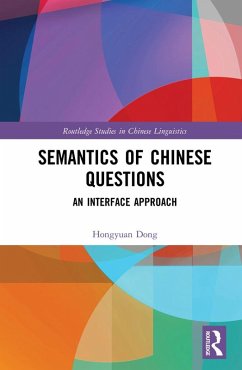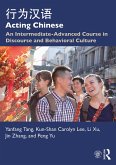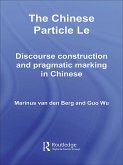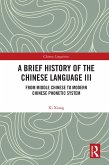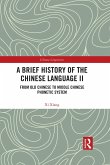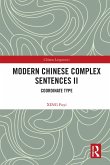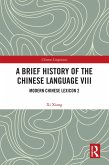44,95 €
44,95 €
inkl. MwSt.
Sofort per Download lieferbar

22 °P sammeln
44,95 €
Als Download kaufen

44,95 €
inkl. MwSt.
Sofort per Download lieferbar

22 °P sammeln
Jetzt verschenken
Alle Infos zum eBook verschenken
44,95 €
inkl. MwSt.
Sofort per Download lieferbar
Alle Infos zum eBook verschenken

22 °P sammeln
- Format: ePub
- Merkliste
- Auf die Merkliste
- Bewerten Bewerten
- Teilen
- Produkt teilen
- Produkterinnerung
- Produkterinnerung

Bitte loggen Sie sich zunächst in Ihr Kundenkonto ein oder registrieren Sie sich bei
bücher.de, um das eBook-Abo tolino select nutzen zu können.
Hier können Sie sich einloggen
Hier können Sie sich einloggen
Sie sind bereits eingeloggt. Klicken Sie auf 2. tolino select Abo, um fortzufahren.

Bitte loggen Sie sich zunächst in Ihr Kundenkonto ein oder registrieren Sie sich bei bücher.de, um das eBook-Abo tolino select nutzen zu können.
Semantics of Chinese Questions is the first major study of Chinese questions, especially wh-questions, within the framework of Alternative Semantics.
- Geräte: eReader
- mit Kopierschutz
- eBook Hilfe
- Größe: 10.53MB
Andere Kunden interessierten sich auch für
![Acting Chinese (eBook, ePUB) Acting Chinese (eBook, ePUB)]() Yanfang TangActing Chinese (eBook, ePUB)31,95 €
Yanfang TangActing Chinese (eBook, ePUB)31,95 €![The Chinese Particle Le (eBook, ePUB) The Chinese Particle Le (eBook, ePUB)]() M. E. van den BergThe Chinese Particle Le (eBook, ePUB)31,95 €
M. E. van den BergThe Chinese Particle Le (eBook, ePUB)31,95 €![A Brief History of the Chinese Language III (eBook, ePUB) A Brief History of the Chinese Language III (eBook, ePUB)]() Xi XiangA Brief History of the Chinese Language III (eBook, ePUB)42,95 €
Xi XiangA Brief History of the Chinese Language III (eBook, ePUB)42,95 €![A Brief History of the Chinese Language II (eBook, ePUB) A Brief History of the Chinese Language II (eBook, ePUB)]() Xi XiangA Brief History of the Chinese Language II (eBook, ePUB)42,95 €
Xi XiangA Brief History of the Chinese Language II (eBook, ePUB)42,95 €![Modern Chinese Complex Sentences II (eBook, ePUB) Modern Chinese Complex Sentences II (eBook, ePUB)]() Xing FuyiModern Chinese Complex Sentences II (eBook, ePUB)33,95 €
Xing FuyiModern Chinese Complex Sentences II (eBook, ePUB)33,95 €![Arabic Translation Across Discourses (eBook, ePUB) Arabic Translation Across Discourses (eBook, ePUB)]() Arabic Translation Across Discourses (eBook, ePUB)41,95 €
Arabic Translation Across Discourses (eBook, ePUB)41,95 €![A Brief History of the Chinese Language VIII (eBook, ePUB) A Brief History of the Chinese Language VIII (eBook, ePUB)]() Xi XiangA Brief History of the Chinese Language VIII (eBook, ePUB)37,95 €
Xi XiangA Brief History of the Chinese Language VIII (eBook, ePUB)37,95 €-
-
-
Semantics of Chinese Questions is the first major study of Chinese questions, especially wh-questions, within the framework of Alternative Semantics.
Dieser Download kann aus rechtlichen Gründen nur mit Rechnungsadresse in A, B, BG, CY, CZ, D, DK, EW, E, FIN, F, GR, HR, H, IRL, I, LT, L, LR, M, NL, PL, P, R, S, SLO, SK ausgeliefert werden.
Produktdetails
- Produktdetails
- Verlag: Taylor & Francis eBooks
- Seitenzahl: 194
- Erscheinungstermin: 7. Dezember 2018
- Englisch
- ISBN-13: 9781351021562
- Artikelnr.: 56845825
- Verlag: Taylor & Francis eBooks
- Seitenzahl: 194
- Erscheinungstermin: 7. Dezember 2018
- Englisch
- ISBN-13: 9781351021562
- Artikelnr.: 56845825
- Herstellerkennzeichnung Die Herstellerinformationen sind derzeit nicht verfügbar.
Hongyuan Dong is Assistant Professor of Chinese Language and Linguistics in the Department of East Asian Languages & Literatures at the George Washington University.
List of illustrations
Preface
Acknowledgements
List of symbols
List of abbreviations
Chapter 1 Introduction
1. Main ideas
2. Questions and Chinese questions
3. The meaning of questions
4. Inquisitive semantics
5. Chapter overview
Chapter 2 LF Movement and Binding in Chinese Questions
2.1 Chinese wh-in-situ
2.2 The LF movement theory
2.3 The binding theory
2.4 The status of the particle -ne
2.5 The diachronic semantics of the particle -ne
Chapter 3 Alternative Semantics of Questions in Chinese
3.1 The alternative semantics theory
3.2 Manner and causal wh-questions
3.3 Verbal "zenme" questions
3.4 A-not-A questions
3.5 Alternative questions
3.6 Polar questions
3.7 The grammaticalization of the particle -ma
3.8 Alternative semantics and inquisitive semantics
Chapter 4 Scope Marking of Questions by Phonological Prominence
4.1 Scope marking of questions phonologically in Chinese
4.2 Experimental data for the scope-marking strategy
4.3 Cross-linguistic comparisons of scope marking of wh-questions
4.4 Focus and wh-pronouns
4.5 Scope isomorphism of focus and its computational derivation
Chapter 5 Revisiting the Argument-Adjunct Asymmetry
5.1 Argument-adjunct asymmetry of Chinese wh-in-situ
5.2 The nominal-adverbial asymmetry
5.3 Operator movement and its problems
5.4 A correlational account of island sensitivity
5.5 A phonological reason for adjoining to scope positions
5.6 Island constraints of A-not-A questions explained
Chapter 6 A Distributional Account of Existential Wh-indefinites
6.1 Distributions of interrogative and existential wh-indefinites
6.2 Alternative semantics and existential readings of wh-indefinites
6.3 Syntactic and phonological factors that disfavor existential readings
6.4 Pragmatic reasoning and licensors of existential readings
6.5 Scope variability of Chinese existential wh-indefinites
Chapter 7 Concluding Remarks
7.1 Theoretical contributions of the interface approach
7.2 Limitations and further research directions
Appendix
References
Index
Preface
Acknowledgements
List of symbols
List of abbreviations
Chapter 1 Introduction
1. Main ideas
2. Questions and Chinese questions
3. The meaning of questions
4. Inquisitive semantics
5. Chapter overview
Chapter 2 LF Movement and Binding in Chinese Questions
2.1 Chinese wh-in-situ
2.2 The LF movement theory
2.3 The binding theory
2.4 The status of the particle -ne
2.5 The diachronic semantics of the particle -ne
Chapter 3 Alternative Semantics of Questions in Chinese
3.1 The alternative semantics theory
3.2 Manner and causal wh-questions
3.3 Verbal "zenme" questions
3.4 A-not-A questions
3.5 Alternative questions
3.6 Polar questions
3.7 The grammaticalization of the particle -ma
3.8 Alternative semantics and inquisitive semantics
Chapter 4 Scope Marking of Questions by Phonological Prominence
4.1 Scope marking of questions phonologically in Chinese
4.2 Experimental data for the scope-marking strategy
4.3 Cross-linguistic comparisons of scope marking of wh-questions
4.4 Focus and wh-pronouns
4.5 Scope isomorphism of focus and its computational derivation
Chapter 5 Revisiting the Argument-Adjunct Asymmetry
5.1 Argument-adjunct asymmetry of Chinese wh-in-situ
5.2 The nominal-adverbial asymmetry
5.3 Operator movement and its problems
5.4 A correlational account of island sensitivity
5.5 A phonological reason for adjoining to scope positions
5.6 Island constraints of A-not-A questions explained
Chapter 6 A Distributional Account of Existential Wh-indefinites
6.1 Distributions of interrogative and existential wh-indefinites
6.2 Alternative semantics and existential readings of wh-indefinites
6.3 Syntactic and phonological factors that disfavor existential readings
6.4 Pragmatic reasoning and licensors of existential readings
6.5 Scope variability of Chinese existential wh-indefinites
Chapter 7 Concluding Remarks
7.1 Theoretical contributions of the interface approach
7.2 Limitations and further research directions
Appendix
References
Index
List of illustrations
Preface
Acknowledgements
List of symbols
List of abbreviations
Chapter 1 Introduction
1. Main ideas
2. Questions and Chinese questions
3. The meaning of questions
4. Inquisitive semantics
5. Chapter overview
Chapter 2 LF Movement and Binding in Chinese Questions
2.1 Chinese wh-in-situ
2.2 The LF movement theory
2.3 The binding theory
2.4 The status of the particle -ne
2.5 The diachronic semantics of the particle -ne
Chapter 3 Alternative Semantics of Questions in Chinese
3.1 The alternative semantics theory
3.2 Manner and causal wh-questions
3.3 Verbal "zenme" questions
3.4 A-not-A questions
3.5 Alternative questions
3.6 Polar questions
3.7 The grammaticalization of the particle -ma
3.8 Alternative semantics and inquisitive semantics
Chapter 4 Scope Marking of Questions by Phonological Prominence
4.1 Scope marking of questions phonologically in Chinese
4.2 Experimental data for the scope-marking strategy
4.3 Cross-linguistic comparisons of scope marking of wh-questions
4.4 Focus and wh-pronouns
4.5 Scope isomorphism of focus and its computational derivation
Chapter 5 Revisiting the Argument-Adjunct Asymmetry
5.1 Argument-adjunct asymmetry of Chinese wh-in-situ
5.2 The nominal-adverbial asymmetry
5.3 Operator movement and its problems
5.4 A correlational account of island sensitivity
5.5 A phonological reason for adjoining to scope positions
5.6 Island constraints of A-not-A questions explained
Chapter 6 A Distributional Account of Existential Wh-indefinites
6.1 Distributions of interrogative and existential wh-indefinites
6.2 Alternative semantics and existential readings of wh-indefinites
6.3 Syntactic and phonological factors that disfavor existential readings
6.4 Pragmatic reasoning and licensors of existential readings
6.5 Scope variability of Chinese existential wh-indefinites
Chapter 7 Concluding Remarks
7.1 Theoretical contributions of the interface approach
7.2 Limitations and further research directions
Appendix
References
Index
Preface
Acknowledgements
List of symbols
List of abbreviations
Chapter 1 Introduction
1. Main ideas
2. Questions and Chinese questions
3. The meaning of questions
4. Inquisitive semantics
5. Chapter overview
Chapter 2 LF Movement and Binding in Chinese Questions
2.1 Chinese wh-in-situ
2.2 The LF movement theory
2.3 The binding theory
2.4 The status of the particle -ne
2.5 The diachronic semantics of the particle -ne
Chapter 3 Alternative Semantics of Questions in Chinese
3.1 The alternative semantics theory
3.2 Manner and causal wh-questions
3.3 Verbal "zenme" questions
3.4 A-not-A questions
3.5 Alternative questions
3.6 Polar questions
3.7 The grammaticalization of the particle -ma
3.8 Alternative semantics and inquisitive semantics
Chapter 4 Scope Marking of Questions by Phonological Prominence
4.1 Scope marking of questions phonologically in Chinese
4.2 Experimental data for the scope-marking strategy
4.3 Cross-linguistic comparisons of scope marking of wh-questions
4.4 Focus and wh-pronouns
4.5 Scope isomorphism of focus and its computational derivation
Chapter 5 Revisiting the Argument-Adjunct Asymmetry
5.1 Argument-adjunct asymmetry of Chinese wh-in-situ
5.2 The nominal-adverbial asymmetry
5.3 Operator movement and its problems
5.4 A correlational account of island sensitivity
5.5 A phonological reason for adjoining to scope positions
5.6 Island constraints of A-not-A questions explained
Chapter 6 A Distributional Account of Existential Wh-indefinites
6.1 Distributions of interrogative and existential wh-indefinites
6.2 Alternative semantics and existential readings of wh-indefinites
6.3 Syntactic and phonological factors that disfavor existential readings
6.4 Pragmatic reasoning and licensors of existential readings
6.5 Scope variability of Chinese existential wh-indefinites
Chapter 7 Concluding Remarks
7.1 Theoretical contributions of the interface approach
7.2 Limitations and further research directions
Appendix
References
Index
